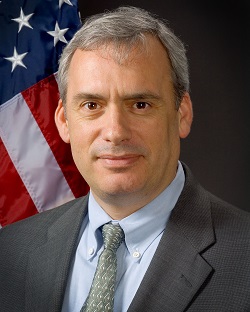Guest Blog By Lek KadeliActing Assistant Administrator in the U.S. Environmental Protection Agency's (EPA) Office of Research and Development (ORD)
Each spring around the same time that so much of the country is swept up in the “madness” of amateur basketball tournaments, a dedicated team of employees at the U.S. Environmental Protection Agency are finishing up preparations to host student teams for another hard-fought college challenge: EPA’s P3 student design competition for sustainability.
While participants may not grab national headlines, the long-term benefits of their efforts have the potential to yield far greater impact for the nation and beyond: environmental sustainability.
“P3” stands for People, Prosperity and the Planet. Working in teams, students and their academic advisors devise innovative solutions to meet environmental challenges in ways that at once benefit people, promote prosperity, and protect the planet. Through that work, the competition engages the greater academic community and the next generation of environmental scientists and engineers in the principles of sustainability.
The competition is a two-phase process. In Phase I, teams submit design proposals for a chance to receive grants of up to $15,000 to research and test original sustainability projects. In addition to research funds, winning teams earn the opportunity to travel to Washington, DC to publically showcase their designs and prototypes at the National Sustainable Design Expo.
During the Expo, teams also showcase their work to a panel of judges for a chance to enter Phase II of the competition—which includes up to $90,000 in additional grant money to help bring their designs and products to the marketplace. Successful P3 projects ultimately benefit the economy and create jobs in our communities.
President Obama said in this year’s State of the Union address “that the nation that goes all-in on innovation today will own the global economy tomorrow.” This program exemplifies that spirit of innovation.
Over the past 10 years, EPA has awarded more than 550 grants to university and college student teams across the nation. A number of teams have leveraged their winning ideas into thriving small businesses and nonprofit organizations, sparking job growth as they advance sustainability and public health. For example:
- An inter-collegiate team made up of students from Harvard University, the Massachusetts Institute of Technology (MIT), and two Chinese universities launched the nonprofit organization One Earth Design (OED) based on their winning project: a solar-powered device that cooks, provides heat, and generates electricity.
- A team from the University of Massachusetts designed a process for producing a nontoxic flame retardant from cashew oil. The end result provides the benefit of suppressing flames that is as effective as the more toxic synthetic retardants in use today.
- Students from the University of Arizona designed an irrigation system for small farmers that also serves as a fish farm. Rows of irrigation ditches filled with fish provide a local source of fertilizer that boosts crop yields while yielding additional sources of food and profit.
- Western Washington University students partnered with local dairy farmers for their project using cow manure as a source of fuel-grade methane for running vehicles.
- Re-design methods developed by a team of University of Tennessee students have helped transform depression-era housing into buildings that meet both energy efficient, green building standards and strict historical preservation codes.
This year marks the 10th anniversary of the EPA’s People, Prosperity, and the Planet (P3) program. Both the P3 public displays and the National Sustainable Design Expo will be held in conjunction with the USA Science and Engineering Festival at the Washington Convention Center, April 26-27. Now in its third year, the USA Science and Engineering Festival is the largest science festival in the United States. Not only does it promise to be every bit as exciting as a certain other recent college competition, you don’t even need tickets!
Lek Kadeli is the Acting Assistant Administrator in the U.S. Environmental Protection Agency's (EPA) Office of Research and Development (ORD). He has over 29 years of management experience in both government and the private sector, with broad experience in leading organizational change and improvement, policy development, resource management, information management and technology.
- Log in to post comments
